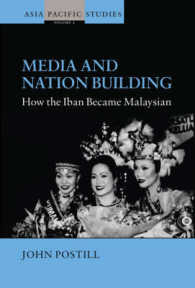- ホーム
- > 洋書
- > 英文書
- > Business / Economics
Full Description
The concept of guanxi is used extensively in Chinese society. Loosely understood as 'connections' or 'networks', it refers to long-term mutually reinforcing exchanges between individuals based on affective and normative commitments. This book comprehensively examines the nature and background of this extremely significant and distinct feature of Chinese social, political, economic, and business relations. It takes account of the major theoretical frameworks that relate to the long-term connections that are developed to pursue instrumental advantage in a society marked by relatively weak legal and regulatory institutions.
The book locates such theorizing in the major features of the rapidly evolving Chinese market society. Yet it also pays attention to the historical origins and cultural sources of a highly particularistic approach to the acquisition of social and material resources -- an approach which relies on obligatory relations of favour exchange between persons who self-consciously and strategically select their associates and goals.
This sociological treatment of guanxi challenges many dominant conventions and introduces a novel research approach which captures the pertinent psychological dispositions, cultural expressions, and institutional frameworks that underpin the phenomenon.
Contents
Introduction: Systematic, Historic, and Cultural Dimensions of Guanxi
1: Making Guanxi
2: Traditional Rural Society: A Model for Guanxi?
3: Reciprocity in Chinese Traditions
4: Renqing as Guanxi and in Guanxi
5: Trust in Guanxi
6: Guanxi, Three Forms or One
Conclusion: The Persistence and Diverse Application of a Changing Form








